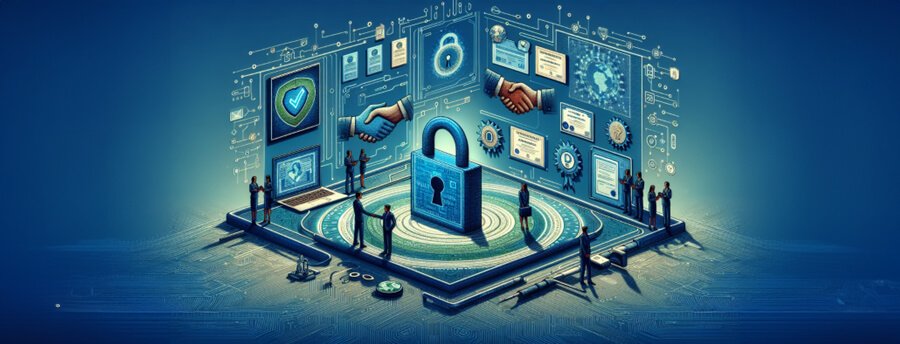The rapid evolution of technology has fundamentally transformed the way we work, interact, and live. As digital tools and automation become more advanced, there is an increasing reliance on technology for performing tasks, communicating, and making decisions. While these technological advancements improve efficiency and productivity, they also highlight the growing importance of soft skills — the personal attributes that enable individuals to interact effectively and harmoniously with others.
Soft skills encompass a wide range of abilities, including communication, collaboration, emotional intelligence, adaptability, and critical thinking, all of which are crucial in the digital age. This essay explores the importance of soft skills in the modern world, emphasizing their value in various professional contexts, the changing work environment, and the increasing demand for emotional and interpersonal capabilities alongside technical proficiency.
Why Soft Skills Are Needed In The Digital Age

1. The Rise of Automation and AI
Automation, artificial intelligence (AI), and other emerging technologies are revolutionizing industries across the globe. While these advancements lead to greater efficiency in repetitive and mundane tasks, they also raise the question of the importance of soft skills. One key aspect that technology cannot replicate is the human ability to think creatively, collaborate, and empathize with others.
Soft skills are essential in this context because they help individuals adapt to the changing demands of the workplace. Tasks that once required manual labor or routine decision-making are now handled by machines, but human workers are increasingly required to oversee, manage, or augment these systems with higher-level cognitive skills.
Skills such as emotional intelligence, creativity, problem-solving, and communication are irreplaceable, making them more valuable than ever in the workforce. As AI and automation continue to evolve, those who excel in these soft skills are better positioned to leverage technology to their advantage, foster collaboration, and create new opportunities in industries that are still adapting to these transformations.
2. Communication in the Digital World
One of the most fundamental soft skills is communication, and in the digital age, effective communication has become even more critical. With the proliferation of digital tools such as emails, video conferences, and collaboration platforms, the way people communicate has evolved dramatically. However, the core principles of good communication — clarity, conciseness, empathy, and listening — remain unchanged.
In virtual environments, non-verbal cues such as body language and facial expressions are often absent, making it harder to gauge emotional tone or intention. Therefore, the ability to express oneself clearly and empathetically through written or spoken words has become essential.
Furthermore, digital communication requires adaptability in terms of adjusting to different platforms, knowing when to use formal or informal language, and effectively managing communication in multicultural and diverse teams.
Effective communication also plays a crucial role in fostering collaboration and ensuring that ideas are shared efficiently across geographically dispersed teams. In the digital world, the ability to bridge communication gaps and facilitate clear, purposeful dialogue is a soft skill that can significantly impact the success of a project or organization.
3. Emotional Intelligence in Digital Interactions
Emotional intelligence (EI) refers to the ability to recognize, understand, and manage one’s emotions, as well as the emotions of others; this is why soft skills matter. In the digital age, where remote work and online interactions are becoming the norm, EI is a key soft skill that helps individuals maintain positive relationships and foster a healthy work environment.
One of the most significant challenges in the digital workplace is the lack of face-to-face interaction, which can lead to misunderstandings, miscommunications, or feelings of isolation. People with high emotional intelligence are better equipped to navigate these challenges because they are able to manage their emotions and empathize with others.
This skill enables them to provide emotional support to colleagues, resolve conflicts diplomatically, and maintain positive working relationships despite the physical distance.
Furthermore, emotional intelligence is critical for effective leadership in the digital age. Leaders with strong EI are able to motivate, inspire, and connect with their teams on a deeper level, helping to create a culture of trust and collaboration even in virtual or hybrid work settings.
4. Adaptability and Flexibility
The digital age is characterized by rapid change, with new technologies, tools, and platforms emerging at an unprecedented pace. As a result, employees must be adaptable and willing to learn new skills to remain competitive. Adaptability is not just about technical skills; it is also a crucial soft skill that encompasses an individual’s ability to adjust their approach to new situations, solve problems in innovative ways, and thrive in dynamic environments.
In an era where companies often pivot or restructure to keep up with technological advances or market demands, the ability to remain flexible and adaptable can make the difference between success and failure. Those who possess this soft skill are better able to manage change, embrace new challenges, and overcome obstacles without losing momentum.
Moreover, the rise of remote and hybrid work environments requires workers to be adaptable in their approaches to time management, communication, and collaboration. With less supervision and more responsibility for self-management, employees must be able to navigate the complexities of digital workspaces and ensure that their productivity does not suffer in the face of new challenges.
5. Collaboration and Teamwork in the Remote Era
While technology has made it easier to work independently, the success and importance of soft skills in most organizations still rely heavily on teamwork. Collaboration in the digital age often involves individuals from different geographical locations, cultures, and time zones, requiring effective communication, conflict resolution, and coordination.
Collaboration is an essential soft skill because it enables individuals to work together effectively to achieve shared goals. With the rise of remote work and the growing prevalence of virtual teams, the ability to collaborate across digital platforms is more important than ever.
Tools like Slack, Microsoft Teams, and Zoom enable real-time communication, but they also require individuals to be highly organized, responsive, and capable of maintaining a sense of cohesion despite physical distance.
Additionally, collaboration in digital environments often involves navigating cultural differences and understanding diverse perspectives. Those who excel at collaboration can contribute their expertise while respecting the ideas and contributions of others, ultimately leading to more innovative solutions and better outcomes for the organization as a whole.
6. Critical Thinking and Problem-Solving
In the digital age, the ability to think critically and solve problems is a highly valued soft skill. While technology can provide solutions to specific problems, it is still humans who need to define the problem, assess various potential solutions, and make the final decisions. Critical thinking involves analyzing situations objectively, recognizing patterns, and questioning assumptions — all of which are necessary for making informed decisions.
Moreover, in an increasingly data-driven world, critical thinking is essential for interpreting and understanding the vast amount of information available. Employees must be able to discern relevant data from irrelevant information, identify trends, and use this knowledge to make informed decisions. Problem-solving, which is closely related to critical thinking, also requires creativity and the ability to approach challenges from different angles.
In the context of technology, critical thinkers are able to assess the potential impacts of new tools or processes, anticipate challenges, and propose solutions before issues escalate. These soft skills are vital for leadership roles, where individuals must be able to navigate complexity and make decisions that will influence the long-term direction of their organization.
7. Leadership and Decision-Making
Effective leadership is an answer to why soft skills matter and remain indispensable in the digital age. While technology enables more efficient decision-making and task delegation, leadership still requires the ability to inspire, motivate, and guide teams toward common goals.
In a fast-paced digital world, strong leaders are needed to manage the complexities of technological integration, foster a culture of innovation, and steer organizations through periods of change. A key aspect of leadership is decision-making, which often involves navigating uncertainty, managing risk, and balancing competing priorities.
In the digital age, leaders are required to make decisions that not only affect the day-to-day operations of the organization but also impact long-term strategy, market positioning, and employee morale. Leaders who possess emotional intelligence, communication skills, and adaptability are better equipped to make decisions that align with the values and goals of the organization while also taking into account the diverse needs of their teams.
Furthermore, the rise of remote work and digital tools requires leaders to adopt new approaches to team management, engagement, and development. Leaders who can foster a sense of belonging and maintain high levels of productivity and morale in virtual environments are more likely to succeed in the digital era.
8. Creativity and Innovation
In an increasingly digital world, creativity has become a key driver of success. While machines can execute repetitive tasks efficiently, it is humans who possess the ability to innovate and come up with new ideas. Creativity is a soft skill that enables individuals to think outside the box, find new solutions to problems, and adapt to evolving challenges.
Innovation is crucial in the digital age, where businesses must continually evolve to stay competitive. Companies that foster a culture of creativity and innovation are more likely to develop new products, services, and business models that respond to changing market demands. Employees who excel in creativity are often at the forefront of driving change within their organizations, challenging conventional thinking, and finding new ways to leverage technology for growth.
Additionally, creativity is essential for improving processes, finding efficiencies, and overcoming obstacles in a fast-paced digital landscape. As technology continues to transform industries, those who can combine their technical expertise with creative thinking will be best positioned to lead the way forward.
9. Conflict Resolution and Negotiation
Even in the digital world, conflicts are inevitable, whether they arise from differences in opinion, misunderstandings, or competing interests. The ability to resolve conflicts and negotiate effectively is a vital soft skill that can significantly impact team dynamics, productivity, and morale.
In a digital environment, where communication is often asynchronous and mediated through technology, misunderstandings can escalate quickly. The ability to navigate these situations with empathy, patience, and tact is crucial for maintaining harmonious relationships in the workplace. Additionally, strong negotiation skills are necessary for addressing disagreements and finding mutually beneficial solutions.
Individuals who possess conflict resolution and negotiation skills can help prevent disputes from escalating into larger issues, ensuring that teams remain focused on their objectives and that collaboration continues smoothly. These soft skills are especially important.
Soft Skills You Need To Thrive In The Digital Age
In the rapidly evolving digital age, technical expertise alone is not enough to succeed in the workplace. As technology continues to reshape industries and job roles, the importance of soft skills has grown exponentially. Soft skills — personal attributes that enhance an individual’s interactions, job performance, and career prospects — are essential for thriving in a digital environment. Below are some of the most important soft skills needed to excel in this new era.
Communication Skills: Effective communication is paramount in the digital age. With teams often spread across multiple locations and communication happening through various platforms — emails, video calls, and instant messaging — the ability to convey ideas clearly and concisely is critical. Strong communication skills help in building collaboration, ensuring that messages are understood, and fostering strong relationships in both virtual and face-to-face settings.
Adaptability: The digital landscape is in constant flux. New tools, platforms, and technologies emerge regularly, and businesses must pivot quickly to stay competitive. Adaptable employees — able to learn new skills, embrace change, and stay open to innovation — are more likely to succeed. Those who resist change may find themselves left behind as organizations seek individuals who can keep pace with technological advancements.
Critical Thinking and Problem-Solving: While AI and automation can handle routine tasks, critical thinking and problem-solving remain distinctly human strengths. The ability to analyze information, identify problems, and develop creative solutions is indispensable in the digital age. As businesses face increasingly complex challenges, employees who can think critically and innovate will be in high demand.
Emotional Intelligence (EI): The ability to understand and manage one’s own emotions and those of others is essential in maintaining productive and harmonious workplace dynamics. In a world where remote work and virtual interactions are prevalent, EI helps individuals navigate relationships, manage conflicts, and work effectively in diverse teams. High EI can foster trust, collaboration, and empathy, which are crucial for success in any professional environment.
Time Management: In a digital world filled with constant notifications, multitasking can often lead to distractions and inefficiency. Effective time management allows individuals to prioritize tasks, focus on what matters, and meet deadlines. The ability to manage one’s time well is essential for maintaining productivity in a world that demands flexibility and fast-paced decision-making.
In conclusion, while technical skills will always be important in the digital age, soft skills play an equally crucial role in ensuring long-term career success. Communication, adaptability, critical thinking, emotional intelligence, and time management are key attributes that help individuals navigate the complexities of modern workplaces and build meaningful, effective professional relationships. By honing these skills, professionals can stay ahead of the curve and thrive in an increasingly digital world.
FAQ
Q: Why is it necessary to acquire soft skills?
A: What is the significance of soft skills in the workplace? Soft skills may help you advance in your job and are crucial for enhancing your ability to collaborate with others. Soft skills may help you locate, draw in, and keep customers, whether you are a self-employed person or a small company owner.
Q: Is the importance of soft skills increasing?
A: Workplaces all across the globe are prioritizing soft skills like empathy, emotional intelligence, critical thinking, and flexibility above hard talents, which were formerly the most important prerequisites for professional advancement.
Q: Is it easy to develop soft skills?
A: Many soft talents may be developed and mastered over time; however, some people may naturally possess them more than others.







